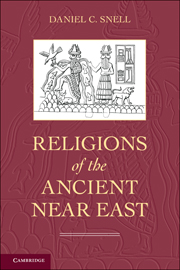Book contents
- Frontmatter
- Contents
- Figures and Maps
- Preface
- Acknowledgments
- 1 Defining Time and Space
- 2 Early Inklings
- 3 Gods, Gods, Gods
- 4 Cities, States, and Gods
- 5 The Lure of Egypt, 4000–1400 BCE
- 6 The Gods of Egypt
- 7 The Akhenaten Dream, 1350–1300 BCE
- 8 Practice in Egypt
- 9 The International Age, 1400–1000 BCE
- 10 Gods and People
- 11 The Lord Is One – Israel in Its Environment
- 12 The Turning
- 13 The Good God and the Bad God
- 14 The Lands of Baal
- 15 Greece, Etruria, Rome, and Conveying Traditions
- 16 The Dead Hand of the Past and the Living God
- 17 Experiencing Ancient Near Eastern Religion
- References
- Index
17 - Experiencing Ancient Near Eastern Religion
Published online by Cambridge University Press: 05 June 2012
- Frontmatter
- Contents
- Figures and Maps
- Preface
- Acknowledgments
- 1 Defining Time and Space
- 2 Early Inklings
- 3 Gods, Gods, Gods
- 4 Cities, States, and Gods
- 5 The Lure of Egypt, 4000–1400 BCE
- 6 The Gods of Egypt
- 7 The Akhenaten Dream, 1350–1300 BCE
- 8 Practice in Egypt
- 9 The International Age, 1400–1000 BCE
- 10 Gods and People
- 11 The Lord Is One – Israel in Its Environment
- 12 The Turning
- 13 The Good God and the Bad God
- 14 The Lands of Baal
- 15 Greece, Etruria, Rome, and Conveying Traditions
- 16 The Dead Hand of the Past and the Living God
- 17 Experiencing Ancient Near Eastern Religion
- References
- Index
Summary
Thus would a sort of polytheism return upon us – a polytheism which I do not on this occasion defend, for my only aim at present is to keep the testimony of religious experience clearly within its proper bounds. Upholders of the monistic view will say to such a polytheism (which, by the way, has always been the real religion of common people, and is so still today) that unless there be one all-inclusive God, our guarantee of security is left imperfect.
– William James, Varieties of Religious Experience, 1912, 525–6First, the sound. The great bombilating blasting of a drum magnified beyond normal hearing by the narrowness of streets and the height of buildings, a distant crashing accompanied by the much less dominating sounds of distant harp music and cymbals. Then the crowd stirred and pressed forward to see the beginning, still blocks away. The hawkers and the gossipers were quieter as the trumpets peeled out in the distance and the sounds grew louder as the procession came closer. People shouted that they could see the beginning, although they could not. The army marshals came first pushing people back on either side of the narrow alleys, and then came the lines and lines of priests, wearing old-fashioned robes of white, singing in their high-pitched voices in archaic language that people could not understand, the language, perhaps, of the gods themselves.
More priests came, and their servants, and their squires, and then the king himself, in a cart crowded with his officers and followed by others on horses, or perhaps they were guards, all armed with polished ceremonial swords. They did not sing, but then people could not hear them not singing because the huge drums followed the king and went immediately before the towering statue of the god's wife, carried by naked priests on a palanquin decked in flowers, and under the flowers the precious metals of it glinted. She was very tall and made of gold and silver, but the striking thing was her jet-black eyes of semiprecious stone that seemed to look deeply into the distant future, up the street and out into the countryside, where they were all headed.
- Type
- Chapter
- Information
- Religions of the Ancient Near East , pp. 162 - 168Publisher: Cambridge University PressPrint publication year: 2010



